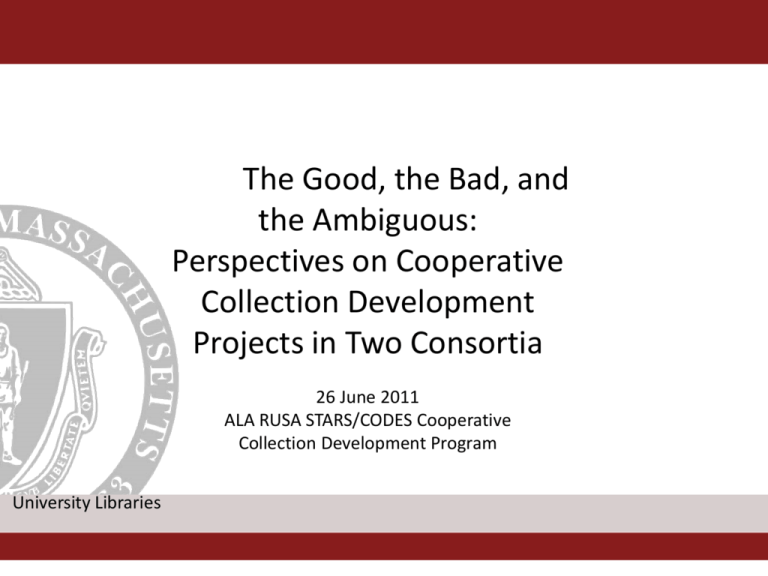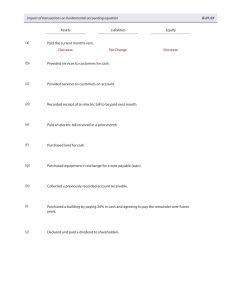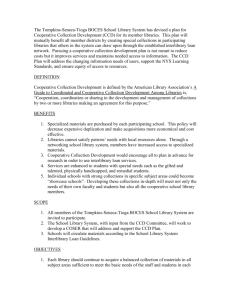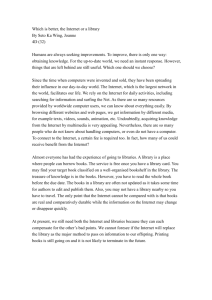The Good, the Bad, and the Ambigious 062611 ALA
advertisement

The Good, the Bad, and the Ambiguous: Perspectives on Cooperative Collection Development Projects in Two Consortia 26 June 2011 ALA RUSA STARS/CODES Cooperative Collection Development Program University Libraries Focus of Comments • Describe two consortia • Describe each consortia’s cooperative collections project • What worked well • What could have been improved Consortia Background Info • Resource Sharing core activity to both consortia • Five Colleges formed in 1960s – – – – – Four private, liberal arts colleges One research-intensive public university Located within 15 mile radius of one another Shared online catalog Standing committees part of governance • Boston Library Consortium (BLC) founded in 1970 – 17 members representing diverse institutions – Shared online catalog – Communities of Interest (COIs) not part of governance Collaborative Collection Development • According to Kohl and Sanville (2006): – Cheaper to borrow low-use books than purchase them – Substantial sharing among consortia members requires major reductions in unit cost and major increases in ease/speed of sharing materials – Possible to substantially improve the cost per use of a book title and increase the richness of the collection by transferring money spent on unnecessary duplication to the purchase of new titles BLC Cooperative Collection Development Project Plan • September 2005 – “… to design and implement a cooperative collection development project that increases the diversity of monographic titles purchased thereby reducing the number of duplicative purchases” • Collection representatives from six participating libraries on project team – Brandeis, Uconn, UMass Amherst, UHN, Wellesley and Williams BLC Cooperative Collection Development Project (CCD) Charge • Purchase, install and implement OCLC WorldCat Collection Analysis Tool (WCAT) • Analyze and assess WCAT comparative data • Review institutional approval plans to identify areas that would benefit from cooperation • Revise approval plans to enhance diversity and reduce overlap • Develop assessment strategies to determine profile-level efforts to enhance diversity BLC CCD Timeline • Oct 2005: Purchase & implement WCAT • Nov 2005: Review institutional approval profiles • Dec 2005: – Assess collection analysis data – Revise profiles – December 2005 • Jan 2006: Implement revised profiles • Feb 2006: Submit Progress Report to BLC Board Steps to Realize BLC CCD • Two different monographic vendors used by project libraries! • Designated YBP as common vendor for project • Experimented with WCAT and understood its use as retrospective, not prospective analysis tool • Used monographic vendor tools to look at purchasing overlap Moving Toward BLC CCD Implementation • Initially targeted ML 3410-3776 as project area due to overlap • Worked with music librarians to create a new, shared YBP approval profile • Music librarians knew each other, were willing to use YBP’s GobiTween and GoBeyond features, and had an enthusiastic and trusted leader among them • Music librarians encouraged project team to expand project scope to M-MT Making the Project Happen! • March/April 2006: Music librarians create shared approval profile • May/June 2006: Two non-YBP libraries send YBP lists of FY06 music monograph purchases • May 2006: Project Team submits Report on Cooperative Collection Development to BLC Board – Expresses desire to expand CCD efforts beyond music – Outlines three factors foundational for future success: • BLC Virtual Catalog all members can participate in • Importance of fostering development of subject selector communities of interest • Develop resource sharing agreements for non-book formats Redefined Measures of Success • • • • • Two additional BLC libraries join CCD project Analyze overlap and unique titles purchased Analyze circulation of items purchased Examine ILL requests for books in M-MT class Review purchase of books in M-MT class for BLC libraries not participating in the project to better FY06 FY07 FY08 FY09 YBP titles profiled 922 822 932 836 # purchased 816 552 659 470 # not purchased 106 270 273 366 88.5% 67.0% 70.7% 56.0% % not purchased 11% 33% 29% 44% Total copies purchased 2170 1408 1820 1397 $128,655 $127,145 $84,914 $71,620 % purchased Total $ expended BCL Project Desired Outcomes Meet Challenges • Defined timelines for investigation proved challenging • Underestimated fact that project libraries used 2 different vendors • Misunderstood WCAT capabilities at that time • Used YBP Gobi to inform purchase overlap • Explored purchasing across LC classification • Reliance solely on approval plans – many music monographs were firm orders or supplied through standing orders • Difficult to analyze circulation data across project libraries due to disparate ILS systems Impetus for Five College CCD Project • Established as one of 4 strategic directions by Five College Library Directors (FCLC) in early 2008 • Five College Presidents and Chancellor sought increased cooperation between institutions • Financial Five College Implementation • Five College Collection Management Committee (CMC) assigned responsibility to propose a cooperative collection development pilot for up to 10 subject areas within defined parameters of: – Increasing number of titles purchased – Expanding depth of print books across consortium – Utilizing YBP as common supplier – Implementation on July 1, 2009 Formulating Five College CCD Project • Initial overlap attempt using WCAT • Revised overlap analysis using shared ILS • Included monographic expenditures, number of titles purchased, and circulation data for each institution by fiscal year Ten Year Overlap Analysis Reveals • Duplication ranged from 36% to 79% • Four Colleges spent $1,139,116 on books purchased by UMass • UMass spent $636,066 on items purchased by 4C • Identified architecture, environmental studies, history, law and sociology for CCD project because of above average overlap percentage Weighing the Options • CMC continued to discuss differences in missions and collection strategies • Global economic downturn changes picture • Five College Presidents continue to press for increased cooperation among libraries • CCD project shifts from focusing on five subject areas to all monographs purchased Discussions Continue • Following this shift, CMC proposes purchasing only one copy of given monographs with the option to purchase additional copies if deemed locally appropriate • Met with YBP regarding implementation • Use GobiTween to inform selection decisions CMC Recommendation • May 2009 recommendation that CMC “….facilitate efforts to better coordinate purchases for book collections, in an effort to reduce unnecessary duplication, so we can increase the breadth and strength of our combined collections. We will order additional copies only when they are clearly required to support teaching, learning and research. This decision will be made at the local level.” The Plan That Emerged • Implemented July 1, 2009 • Shifted from one copy to reducing duplication • Exceptions – – – – – Reserve requests ILL requests (if certain criteria met) Faculty requests Books with holds Core to collection or research needs Monograph Duplication within the Five Colleges Consortium Year Owned by 2 Owned by 3-5 Total Libraries Libraries Duplication FY10 28% 22% 51% FY09 26% 34% 60% FY08 24% 38% 61% FY07 22% 41% 63% Five Colleges Monograph Duplication Analysis - FY10 FY10 Total Monographs Purchased Amherst Hamp MHC Smith 1,850 6,925 $671,857 $69,373 $304,892 Total Circulation * 37% 39% 36% 27% 60% 36% % Duplication 49% 75% 60% 44% 52% 51% % Circulation of Duplicated Items 42% 39% 38% 31% 70% 40% $351,872 $52,293 $166,040 $238,891 $68,347 $877,443 Cost of Duplicated Items * Total circulation is from time of purchase through 8/5/2010 3,384 Total 14,601 Cost 11,979 UMASS 38,739 $746,400 $165,345 $1,957,867 Future 5C CCD Ventures • Looking at spreadsheet of heavily requested books – Books requested 3 or more times in 60 days – Replacing “lost” books if only 1 copy available • Cooperative purchase of eBooks • Sharing some electronic resources in common What Worked Well • • • • • Directors ask existing groups to implement Directors define parameters Continued to control own purchases Shared catalog set stage for sharing materials Assessment reveals reduction in duplication How Things Stand – June 2011 • BLC music CCD project still in place – Music librarians wondering what role eBooks have – WorldCat Local now BLC virtual catalog – Small cooperative science eBook purchase • Five College project in 2nd year – Steps in place to extract & analyze FY11 data – Exploring cooperative eBook purchase of heavily requested print books Conclusion • BLC project cooperative and relies on approval plan • 5C project collaborative, relying on staff to exercise judgment • Important to involve staff in process • Allow time to do so What Could Have Been Improved? • For BLC Project – Rationale for project need; staff did not see “compelling need” – Letting the group work out more of the details – Longer timeline? – Inability to expand project beyond M-MT • For 5C Project – Venue for selector discussion – FY10 was a bad budget year and will be helpful to see FY11 overlap analysis Questions? Contact information: Leslie Horner Button Associate Director for Library Services UMass Amherst Libraries button@library.umass.edu University Libraries Selected Resources Kohl, David F. and Tom Sanville. “More Bang for the Buck: Increasing the Effectiveness of Library Expenditures Through Cooperation.” Library Trends, 54(3): pp. 394-410. Button, Leslie Horner and Rachel Lewellen. “Leveraging Resources to Avoid Lost Opportunities: Consortial Collection Analysis to Reduce Unnecessary Monographic Duplication.” Presented October 27, 2010, at the 2010 ARL Assessment Conference in Baltimore, Maryland. http://libraryassessment.org/bm~doc/lewellen_rachel.pdf.





